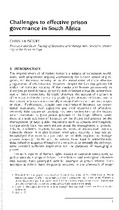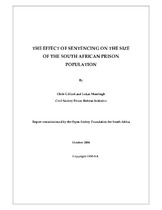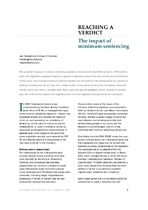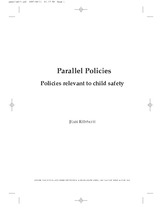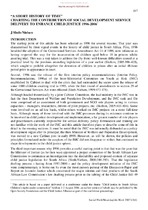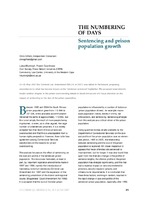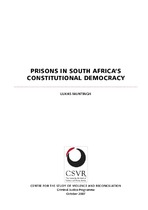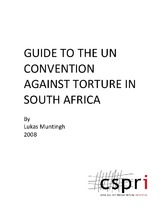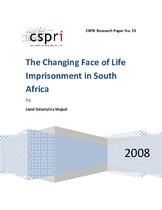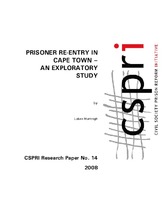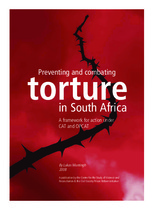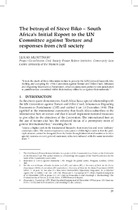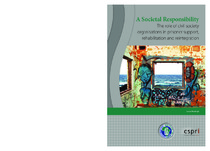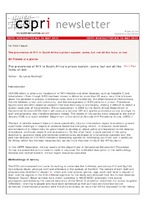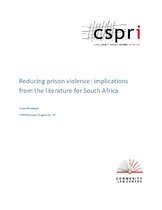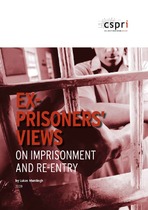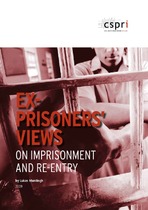Browsing Civil Society Prison Reform by Issue Date
Now showing items 21-40 of 85
-
Challenges to effective prison governance in South Africa
(Law, Democracy & Development, 2006)In an attempt to broaden the debate on prison reform in South Africa, this article reports on the findings of the investigation into the status of governance in selected prisons around the country. The study. which set out ... -
Prisoners' access to anti-retroviral treatment
(Civil Society Prison Reform Initiative, 2006)Prisoners are susceptible to a number of illness and diseases. This may relate to the conditions of prisons themselves (e.g. poor ventilation is associated with TB), life style (e.g. poor nutrition and substance abuse), ... -
The effect of sentencing on the size of the South African prison population
(Open Society Foundation for South Africa, 2006-10)That South African prisons are experiencing serious and growing overcrowding problem is well-known to anyone with an interest in the criminal justice sector. Particularly since 2000 the widening gap between available prison ... -
Reaching A Verdict: The impact of minimum sentencing
(South African Crime Quarterly, 2007)The so-called ‘temporary’ minimum sentencing legislation introduced into South African law in 1998 is still in place. The legislation was passed largely in response to high crime rates at the time and the perceived leniency ... -
Parallel Policies: Policies relevant to child safety
(Centre for Justice and Crime Prevention, 2007)The Centre for Justice and Crime Prevention’s 2005 National Youth Victimisation Study indicated the need to explore existing policy impacting on children from a social crime prevention perspective within a rights-based ... -
Stop prison rape in South Africa
(Agenda, 2007)South Africa has some of the highest rates of rape in the world. Activists have drawn attention to the devastating effect this has on women and children. However, insufficient attention has been paid to rape - predominantly ... -
'A short history of time' charting the contribution of social development service delivery to enhance child justice 1996-2006
(Journal of Social Work, 2007)The starting point of this article has been selected as 1996 for several reasons. That year was characterised by three signal events in the history of child justice in South Africa. First, 1996 heralded the adoption of the ... -
The numbering of days: Sentencing and prison population growth
(Institute for Security Studies (ISS), 2007)On 30 May 2007 the Criminal Law Amendment Bill (15 of 2007) was tabled in Parliament, proposing amendments to what has become known as the 'minimum sentences' legislation. The proposed amendments herald another chapter in ... -
Prisons in South Africa's constitutional democracy
(Centre for the Study of Violence and Reconciliation, 2007-10)In this article it will be argued that to make prisons compatible with a constitutional democracy, as understood in South Africa, four requirements need to be met. First, the prison system must have an underlying philosophical ... -
Guide to the UN Convention against torture in South Africa
(Civil Society Prison Reform Initiative, 2008)This publication is a guide to the UN Convention against Torture and Cruel, Inhuman and Degrading Treatment or Punishment (CAT) for the South African context. The guide is furthermore aimed at civil society organisations ... -
The changing face of life imprisonment in South Africa
(Civil Society Prison Reform Initiative, 2008)This article investigates the meaning and use of life imprisonment in South Africa in four major legal historical eras: life imprisonment at the time when the death penalty was still lawful in South Africa (including life ... -
Prisoner re-entry in Cape Town - an exploratory study
(Civil Society Prison Reform Initiative, 2008)This study is concerned with the immediate post-release period and asked a very simple question: “What happens to people immediately after they have been released from prison?” The question is aimed at gaining a deeper and ... -
Punishment and deterrence: don’t expect prisons to reduce crime
(SA Crime Quarterly, 2008)The belief is thoroughly entrenched that prisons fulfil the triple function of punishing offenders, making society safer by removing dangerous individuals, and deterring potential offenders from committing crime. The fact ... -
Preventing and combating torture in South Africa: a framework for action under CAT and OPCAT
(Centre for the Study of Violence and Reconciliation & Civil Society Prison Reform Initiative, 2008)This booklet aims to provide more information to decision-makers and stakeholders on the challenges relating to preventing and combating torture; and also outlines South Africa’s obligations under CAT and OPCAT. These two ... -
The betrayal of Steve Biko – South Africa’s initial report to the UN Committee against torture and responses from civil society
(Law, Democracy & Development, 2008)This article will focus on State Party obligations in respect of reporting to the UN Committee against Torture (the Committee) under article 19(1)17 of CAT and more particularly on civil society’s interaction with the ... -
A Societal Responsibility : The role of civil society organisations in prisoner support, rehabilitation and reintegration
(Institute for Security Studies and the Community Law Centre, University of the Western Cape, 2008)Civil society organisations play a key role in assisting prisoners and ex-prisoners to reintegrate into society and may at present render the bulk of such services. It is especially in respect of post-release support ... -
The prevalence of HIV in South Africa's prison system: some, but not all the facts, at last
(Civil Society Prison Reform Initiative, 2008-05-26)The lack of reliable research data and more specifically, data on intervention impact evaluations, present a particular challenge in respect of evidence-based law and policy reform. In resource-constrained environments it ... -
Reducing prison violence: implications from the literature for South Africa
(Civil Society Prison Reform Initiative, 2009)In the past 15 years the Department of Correctional Services (DCS) has faced numerous challenges whilst trying to re‐invent itself. This has not been an easy road and in many regards the route to penetrative transformation ... -
Ex-prisoners' views on imprisonment and re-entry
(Civil Society Prison Reform Initiative, 2009)This research project gathered information from ex-prisoners about their experiences during and after imprisonment. Knowing what prison system users think and say about the system is important because they are ultimately ... -
Ex-prisoners' views on imprisonment and re-entry
(Community Law Centre, University of the Western Cape, 2009)In the past 15 years much research has been conducted on the prison system in South Africa focusing on governance, law reform and human rights. It is, however, of particular concern that the voices of prisoners and ...

